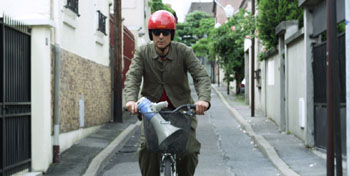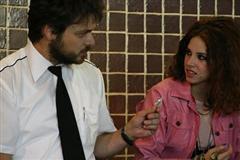Fuse Film Review: Two at BJFF — “We Are Not Alone” and “In Case I Don’t Win the Golden Palm”
It can be a long wait for the end of the world, even though it lies only a week away, to wit, from the beginning to the end of the Israeli film We Are Not Alone.
By Joann Green Breuer.
In Case I Don’t Win the Golden Palm (au cas ou je n’aurais pas la palme d’or). Directed by Renaud Cohen. France, 2011. At The Boston Jewish Film Festival, November 15.
The artist is dying, and his urge to make art can wreak havoc with his desire to enjoy life. It can also make for a film that skirts and toys with narcissism by taking the path of necessary, poignantly absurd, artistic egoism. Simon, the filmmaker at the center of In Case I Don’t Win the Golden Palm, takes his lumps, the literal, possibly cancerous one on the top of his head as well as the metaphorical ones from the reluctant financial sponsors of his potential celluloid opus. He sputters through his final days (the film’s narrative opens at his funeral) with light-headed determination, a doomed clown sans makeup, his still honest smile forged of desperate optimism, our smiles a mirror of his.
Renaud Cohen enlisted his actual family to appear in this pseudo documentary, one which may sadly ring true to many, many performance artists. Perhaps the show must go on, but why must it go on so long without ME???
Ten years after Simon has made his last film he joins a filmmakers’ anonymous group, lest his next effort, now that he has fallen off the creative wagon, end up as hopelessly unproduced cinematography. The analogy of art-ism to alcoholism is amusing, and bitter. It is that balance that the film, and the film within the film, attempts to sustain, and that, for the most part, In Case I Don’t Win succeeds in pulling off.
Simon’s abundant narration of the film can be cloying—the professor’s old mantra of “show, don’t tell” echoes in the viewer’s mind intermittently, but Simon is a fair narrator, his vulnerability valid compensation for his verbosity. We watch scenes from his failed efforts, always infused with sweet pathos, the stranger displaced in an unfamiliar culture. We recognize that just as the film that Simon is now making is a narrative of his life, so all his previous films have been metaphors for it, though Simon himself is blind to that delicate, obvious truth.
Simon knows that his life is good: his wife, his children, attractive, intelligent. But quotidian patterns, however good, do not suffice. Simon’s need to create is as much a genetic mutation as that lump on his cranium, as formational and as fatal.
The Jewishness of In Case I Don’t Win is contextual, not causational. If there is a “lump under every yarmulke,” no Jew would be surprised. When a character states with matter-of-fact resignation that “God is never there when we need him,” we hear an overtone of Yiddish nigun and silently hum along.
It is a brief, contrasting melody to the pervasive musical soundtrack, alien, rich, and right. The extended moments of Simon’s daughter’s violin practice jolt the ear and, as yet another character judges, “touch something deep in a light way,” precisely as Simon wishes his films to do.
Simon peddles his velocipede now speedily, now slipping and stopping suddenly, its wheels tumbling and spinning just above the concrete street. Pay attention to those random moves. “All stories are hard to tell,” says one character. This is not excuse for inconsistent autobiographical reckoning. It is justification for it.
We Are Not Alone. Directed by Lior Har-Lev. Israel, 2011. At The Boston Jewish Film Festival, November 17.
It can be a long wait for the end of the world, even though it lies only a week away, to wit, from the beginning to the end of the Israeli film We Are Not Alone. Our civilization, as exemplified by the film’s setting, a contemporary mall, is limited. We are at the end of the Mayan calendar’s fifth cycle. Time to start over. Eddie, a scruffy, innocent guard at the mall will be the one to fertilize the world to come. He has read the Mayan holy book, he believes its message, and he is preparing to live by it, a new Adam in a new world.
The Jewish trope calls: “to save a life is to save the world.” Eddie will save a life. Of course, his searching for bombs in consumers’ handbags is perchance saving many lives, but the anonymity of shoppers (very cinema verite, by the way) is too vague for prophetic fulfillment. Enter May, the unkempt, homeless temptress, and we have plot, purpose, and predictability. Her forlorn life is Eddie’s destined, if clichéd, encounter.
Eddie keeps his own calendar, blacking out day by day until arrival of Armageddon/the rapture, hoards shoe boxes filled with surreptitiously confiscated items representative of the middle class, and maintains his mall duties, a symbolic guardian of the human race, to the, he expects, last possible moment: May 23. Serendipitously, note the name of the film’s sloppy siren: May. And the calendar: May-an. But the film is in Hebrew, enough English fun and word games . . .
May is unappealing in unredemptive ways, her raggedy hair framing a badly make-up-ed face, a cigarette often dangling from purple-nailed fingers. Eddie and May, representing the mystical pairing, virgin and vixen, do not have the credible erotic magnetism that this scenario demands. Their attraction feels contrived, multiply unfortunate considering the contrivance of apocalyptic expectation. May is neither waif nor wanton in extremis, and Eddie is tousled but not addled. Lonely he may be, and gullible, but Eddie is kind and still alert. He notes global warming and nuclear proliferation as evidence of Mayan perspicacity—and who is to deny him?
The muzak at the mall is appropriate, if irksome, suffused with commercial sentimentality. The glass elevators give modernism its due, as both invisible and invincible barrier that they create between watcher and shopper as consumers glide between mall levels and in an after hours mime when Eddie and May mug movie roles in parallel elevators. Thus separated, they are more in sync in silence than in speech.
As in many existential myths, there needs be a wise jester. He is present, a buck toothed, wire-haired employee who in motley offers diversion for children and for Eddie. He walks up the down escalator; he extols “dreams and aspirations.” To move is to progress, even if the moving is in the wrong direction.
“The end of civilization is not the end of humanity,” however. For the important message proffered by the movie, stay for the end credits even if you do not read Hebrew . . . and even if you have already divined it.


